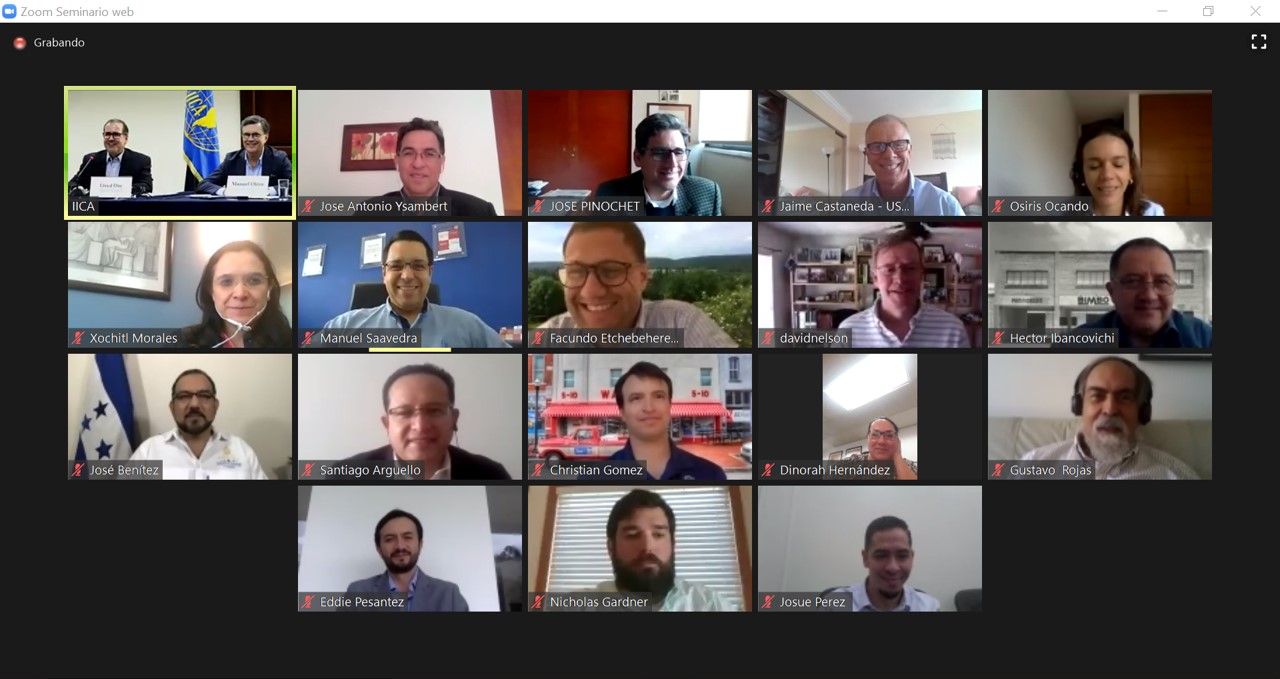The suggestions arose during a virtual meeting, organized by IICA, where they stressed the need to maintain the flow of trade; avoid protectionism and to move toward agricultural digitalization.

San Jose, 10 July 2020 (IICA). Deputy Ministers and Undersecretaries of Agriculture from various Latin American and Caribbean (LAC) countries, as well as other agricultural authorities and company representatives, participated in a virtual discussion to drive joint actions to address Covid-19 food security challenges, now and in the aftermath of the pandemic.
The meeting was spearheaded by the Inter-American Institute for Cooperation on Agriculture (IICA), as part of its support to its Member States – providing information to facilitate decision-making on the food supply and trade.
In his opening remarks, IICA Director General, Manuel Otero, remarked that, “The Ministries of Agriculture, in collaboration with private sector companies and with the support of international cooperation, have the responsibility to develop and strengthen agrifood systems in the countries; to provide safe and high-quality food to our people; and to ensure that we are the leading net food exporting region in the world”.
The agricultural authorities and businessmen all agreed on the vital importance of maintaining open borders and the flow of trade; protecting the health of workers throughout the agrifood chain; minimizing trade barriers and excessive sanitary regulation; automating and digitalizing certification and strengthening electronic trade.
“Agriculture is an essential activity”, said José Ignacio Pinochet, Chile’s Undersecretary of Agriculture. “It has been positioned in this way during the pandemic and we must continue to treat it as a priority. It will be our source of hope in the economic crisis that is approaching, and thus the information that we receive from the private sector will be critical. Its macro perspective will help us to determine what we will face in the months and years ahead”.
During the discussions, José Alberto Benítez, Undersecretary of Agriculture of Honduras, said we must encourage farmers to continue producing and to remain competitive, within the context of sustainability and inclusiveness, and we must minimize the impact of the health crisis on the sector, as much as possible.
He cautioned that, “We cannot leave farmers to fend for themselves. We must train them so that they can adopt biosecurity norms in their work. The Coronavirus is challenging us to maximize our creativity. Life will not be the same again and we will be affected, but we must try to manage as best as possible”.
Ecuador’s Deputy Minister of Agricultural Production Development, Eddie Pesántez; Mexico’s Director General of Agricultural Development, Santiago Argüello, along with the Assistant Director General, Dinorah Hernández; as well as the Director of the Planning Department of the Dominican Republic, Josué Pérez ,were some of the other public sector representatives attending the meeting.
Substantial improvements
The participating private sector representatives also pointed out to the government authorities that the agriculture sector must reinvent itself, moving towards digitalization and guaranteeing producers’ access to technological tools and innovation. It must also upgrade its infrastructure, connectivity, literacy, succession planning and financing, aiming to institute more efficient, sustainable and inclusive systems.
They also emphasized the urgent need for efficient regulatory processes and systems, particularly with regards to new varieties of seeds and agricultural inputs. The businessmen recognized that any headway made in these issues would hinge on public-private partnerships.
“We must lay the foundation for the future”, insisted Osiris Ocando, Latin America Agricultural Policy and Government Relationships Lead at Bayer. The pandemic has also created several opportunities on which we must capitalize, for example, by leveraging digitalization and connectivity to develop and transform agriculture in rural areas into the sector that we envision”.
Héctor Ibancovichi, from the Procurement and Agribusiness Division of Bimbo, further expanded on this, saying that, “We must take our funding to rural areas to enable them to make use of these technologies, replacing traditional agriculture with high-tech agriculture. We will need education and training”.
Paula Uribe, Senior Manager for Global Public Policy and Government Affairs at PepsiCo, expressed a desire to “work with ministries of agriculture and to foster vibrant discussions to resolve regulatory and infrastructural issues”.
Uribe explained that, “We find it difficult to produce in rural areas that wish to develop but that are not extremely competitive, due to infrastructural issues such as transportation, for example. We want to share practices and training about environmental protection; water and soil use; human rights and fair pay for farmers”.
Other entities that participated in the discussions were Walmart, Syngenta, Cargill, the Dos Pinos Milk Producers Cooperative, Danone, McCormick Central America, Reckitt Benckiser, the International Council of Beverage Associations, the National Milk Producers Federation of the United States, and Codex and International Regulatory Affairs at the U.S. Dairy Export Council.
In closing the virtual event, the IICA Director General suggested that another meeting should be held, focusing on science and technology, with a view to spurring a debate about the innovation and development agenda in LAC.
Manuel Otero maintained that, “A major public-private effort is needed; the time has come for all of us to join forces. We must devise a common agenda to promote science, technology and the new generation of farmers, because tomorrow’s agriculture will be more sophisticated and technology-driven, providing solutions in a much more complex scenario”.
More information:
Institutional Communication Division, IICA.











